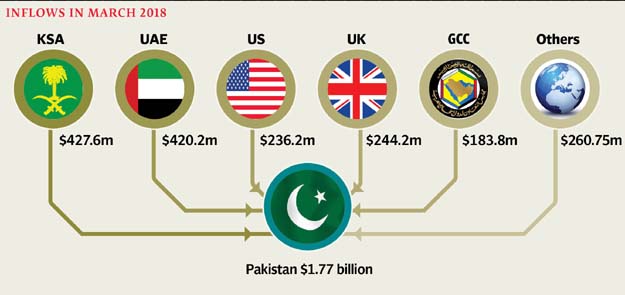Remittances touch seven-month high at $1.77 billion in March
Saudi Arabia remained largest source with $427.62 million

Saudi Arabia remained largest source with $427.62 million
PHOTO: AFP
The amount is 4.6% higher than $1.69 billion received in the same month (March) of the previous year and 22.24% higher than $1.45 billion received in the previous month of February 2018.
The amount of $1.77 billion is the highest in the last seven months, next to $1.95 billion received in August 2017, according to the central bank.
Govt mulls taxing remittances
“This is an unusual pick up (in remittances)…devaluation is the primary reason for this higher number,” EFG Hermes Pakistan Chief Executive Office Muzammil Aslam told The Express Tribune.
“Higher remittances have no connection with the recently-announced amnesty scheme. Its impact has yet to come,” he added.
There was strong speculation about the then devaluation in the market. Overseas Pakistani workers were also aware of the rumour, he said.
Aslam expressed hope that remittances would remain on the higher side in the remaining three months (April-June 2018) of the current fiscal year 2018 due to a weaker rupee and the amnesty scheme announced recently by the country’s prime minister.
Another market analyst opined that the proposed taxation on remittances at the value of over $100,000 a year (to check misuse of funds) might be one of the reasons why overseas Pakistanis sent a higher amount to their families.

Total remittances for the first nine months (July 2017 to March 2018) of the current fiscal year 2018 amounted to $14.6 billion, 3.55% higher than $14.10 billion in the corresponding period last year, the central bank reported.
The bank recently anticipated in its latest quarterly report on the state of Pakistan’s economy that the country would attract a maximum of $20.5 billion in remittances in fiscal year 2018.
If its projection is met, then the total remittance would be slightly higher than last year’s number of $19.3 billion, but short of the set target of $20.7 billion.
The unusual pickup in remittances, however, remained insufficient to offset the massive impact coming from exorbitant imports and lower-than-needed increase in exports. Accordingly, the current account deficit has widened 48% to $9.15 billion in the first seven months of the current fiscal year, eating up foreign exchange reserves at a fast pace.
Country-wise remittance
Saudi Arabia remained the single largest source of remittances to Pakistan. Overseas Pakistanis living in the country sent $427.62 million in March 2018. The number was 15% lower than $504.61 million in the same month last year, but higher by 23% compared to $348.31 million in the previous month of February 2018.
Naval chief bestowed with Saudi Arabia's highest military award
Pakistani living in UAE sent remittances of $420.24 million. They sent $362.94 million in March 2017 and $332.18 million in the previous month.
UK and US were at the third and fourth position at $244.20 million and 236.17 million, respectively.
GCC countries, including Bahrain, Kuwait, Qatar and Oman sent a total of $183.79 million, which was lower than in March 2017, but higher than February 2018.
Workers from EU countries sent a total of $58.89 million, which remained higher on a yearly and monthly basis.
Remittances from Malaysia amounted to $116.09 million in March 2018, Canada $18.36 million, Australia $17.80 million, Norway $3.70 million, Switzerland $2.50 million and Japan sent $1.79 million. Remittances from other countries amounted to $41.62 million in March 2018.
Published in The Express Tribune, April 11th, 2018.
Like Business on Facebook, follow @TribuneBiz on Twitter to stay informed and join in the conversation.



















COMMENTS
Comments are moderated and generally will be posted if they are on-topic and not abusive.
For more information, please see our Comments FAQ